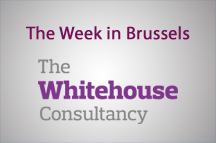 The European Commission this week published its proposal to grant Turkish citizens visa-free travel, a measure originally agreed to in March as part of the EU-Turkey deal to tackle the refugee crisis. Although a lot of hay was made in the press about the proposal, this is still contingent on Turkey meeting a number of outstanding criteria in areas such as the fight against corruption, data protection, judicial cooperation with all Member States, enhanced cooperation with EUROPOL and revision of the legislation and practices on terrorism.
The European Commission this week published its proposal to grant Turkish citizens visa-free travel, a measure originally agreed to in March as part of the EU-Turkey deal to tackle the refugee crisis. Although a lot of hay was made in the press about the proposal, this is still contingent on Turkey meeting a number of outstanding criteria in areas such as the fight against corruption, data protection, judicial cooperation with all Member States, enhanced cooperation with EUROPOL and revision of the legislation and practices on terrorism.
If it goes through, the proposal will see visa-free travel applying to all EU Member States except Ireland and the UK, as well as to the four Schengen associated countries (Iceland, Liechtenstein, Norway and Switzerland). The proposal does not include the right to work but only short stays of up to 90 days in a 180-day period for business, tourist or family purposes, among others.
Although the agreement was undoubtedly a PR victory for the Turkish Government, it was almost immediately overshadowed by concern, following news that the Turkish Prime Minister Ahmet Davutoglu would not be a candidate for the upcoming leadership election of Turkey’s ruling Justice and Development Party. His decision was viewed as a behind the scenes power grab by President Recep Tayyip Erdogan, resulting in the latter further consolidating his power.

This development will serve to further complicate matters for the visa-free travel proposal, which had already been met with scepticism by Members of the European Parliament and with support by national governments also far from certain. It is also likely to have more wide-reaching repercussions on the EU-Turkey migration deal and bilateral relations in general. Understandably, and given that Turkey has become – admittedly, very cleverly - an essential part of the EU’s refugee policy, lawmakers are, somewhat justly, concerned that political necessities might result in the EU taking a softer approach on Turkey’s implementation of the reforms necessary for securing visa-free travel. Commenting on the proposal, parliamentary political group leaders were keen to emphasise that “There will be no shortcut in parliamentary procedures”.
It could be that Erdogan, knowing how important Turkey is to Europe at the moment, took a gamble that paid off, judging that he could further solidify his position with little to no immediate repercussions. In the longer term, however, Davutoglu’s role as a credible interlocutor was fundamental in negotiations with the EU leadership and national leaders, as he was considered a reliable partner, compared to Erdogan’s entourage which is more prone to provocation. At the time of writing, EU officials were still monitoring the situation, which is likely to result in an increasingly hostile attitude, at least on the side of the European Parliament for further EU dealings with Turkey.












